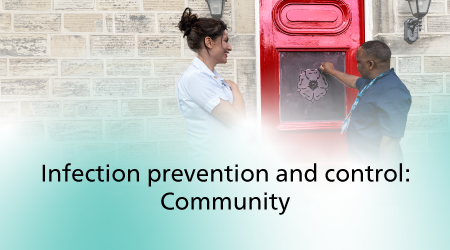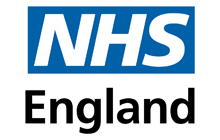About the Infection prevention and control: community programme
Infection Prevention and Control (IPC) is of huge importance in the community setting, many people even if cared for in hospital may be discharged to a community setting far sooner, with a range of complex medical needs and requirements. NHS England has worked with community NHS providers to develop a bespoke e-learning for health training package for clinical staff that are undertaking visits into patient homes. It will outline some of the potential concerns that can arise in the home setting and the risk assessment and precautions that need to be in place to ensure that safe, quality care is provided.
For all health and social care workers, we all want to strive to reduce and avoid where possible preventable health care associated infections (HCAI’s), which can be more challenging given the complexity of health care in the community setting. The IPC principles in this session are transferrable and apply to a range of healthcare professionals and different community settings, for example visiting paediatrics in the home, a GP undertaking a home visit or physiotherapists providing support to someone in their home.
The training is in line with the National IPC Education Framework and provides a series of short videos and questions for the user to complete. It takes between 30-60 minutes to complete.
More information
The UK 5-year action plan for antimicrobial resistance 2019-24 (Department of Health and Social Care, 2019) includes a national ambition to reduce healthcare acquired Gram-negative blood stream infections (HA-GNBSI) by 50% by 2024.
To improve patient outcomes, reduce healthcare costs and prevent unnecessary risks it is essential that everyone involved in the care of patients is educated and knowledgeable about the principles of aseptic technique practice and when to appropriately apply them.
This pilot session has been produced so that it can be accessed by all to update their IPC practices.
The Infection Prevention Control Tier 2 – Out of Hospital Setting Pilot forms part of the existing Infection Prevention Control Level 2 session from the Statutory and Mandatory Programme launched in 2018.
The pilot focuses on enhancing the (Out of Hospital Setting) scenario utilising video elements to capture the following learning outcomes: –
- standard infection control precautions (SICPs) relevant to your role and work setting
- how to prevent infection associated with invasive devices and procedures as relevant to role and work setting
- the significance of alert organisms and conditions that pose an infection risk
- transmission based precautions (TBPs) and when they may be required, relevant to your role and work setting
- how and when to seek support in situations that are beyond experience and expertise according to role
- how to identify and use current evidence-based guidance, policies and protocols to inform IPC practice
- how to apply appropriate policies/procedures and guidelines when collecting and handling specimens
- how to recognise the different symptoms of infection as appropriate to their role/context
- how to apply identified antimicrobial stewardship (AMS) principles and good practice, using current evidence-based guidance, local policies and protocols in a manner which is contextually relevant to their role for example, the difference between broad and narrow spectrum antimicrobials and/or the role broad spectrum antibiotics play in antimicrobial resistance (AMR)
Please note in addition to the above learning objectives, professional staff will receive IPC education as part of their basic or initial core training in higher education institutions. It is also important for staff members to take time to reflect on their actions and the impact this has on safe and effective IPC. Examples of further learning could be; talking to peers, focusing on specific events, informal or formal mentoring, local role specific activities such as Schwartz rounds and listening and acting on feedback.
Acknowledgements
Dawn Scholes, Leeds Community Healthcare, NHS Trust
Laura Ojala, Leeds Community Healthcare, NHS Trust
Michelle Higgins, Leeds Community Healthcare, NHS Trust
Sharon Astley, Leeds Community Healthcare, NHS Trust
Catherine Harrison, Leeds Community Healthcare, NHS Trust
Kirsty Taylor, Leeds Community Healthcare, NHS Trust
Temba Ndirigu, Leeds Community Healthcare, NHS Trust
Joanne Reynard, Leeds Community Healthcare, NHS Trust
Leslie Macleod-Downes, NS Gloucestershire ICB
Lesley McKay, Warrington and Halton Teaching Hospitals NHS Foundation Trust
Connie Timmins, NHS Bath and North East Somerset, Swindon and Wiltshire ICB
Meet the team

Liz Grogan
Deputy Director of Infection Prevention and Control, Leeds Community Healthcare NHS Trust
Valya Weston
IPC Nurse Consultant, National Infection Prevention and Control Team, NHS England
Andi Blackmore
TEL Education Content Programme Manager, NHS England
Dave Beardmore
TEL Education Content Senior Project Manager, NHS England
Angelina Montinaro
TEL Education Content Lead Learning Designer, NHS England
Ian Blacklock
TEL Education Content Lead Learning Designer, NHS England
Abigail Lingford
TEL Education Content Graphic Designer, NHS England
How to access
To access this elfh programme, you will require a Learning Hub account. If you do not have one, then you can register by selecting the Register button below. Note that if you hold a full elfh account, you can sign into the Learning Hub using your existing login credentials.
To view the Infection prevention and control: community programme, select the View button below. If you already have a Learning Hub account, you will also be able to login and access the resources within the programme .
NHS healthcare staff in England – ESR
The Infection prevention and control: community programme is also available to NHS healthcare staff via the Electronic Staff Record (ESR). Accessing this elearning via ESR means that your completions will transfer with you throughout your NHS career.
Further details about the Electronic Staff Record (ESR).
Not an NHS organisation?
If you are not an NHS health or care organisation and therefore do not qualify for free access to the Learning Hub, you may be able to access the service if you have an existing OpenAthens account. Please go to Learning Hub and sign in with your existing credentials.
If you do not have an existing OpenAthens account, please contact elfh directly to check whether you may be eligible for access.
Registering large numbers of users
If you are a HR, IT or Practice Manager and would like to register and enrol large numbers of staff within your organisation for access onto the Infection prevention and control: community programme, please contact elfh directly.
Organisations wishing to use their own LMS
For HR departments wanting to know more about gaining access to courses using an existing Learning Management System please contact elfh directly to express interest.
More information
Please select the following link for more information on how to use the Learning Hub




